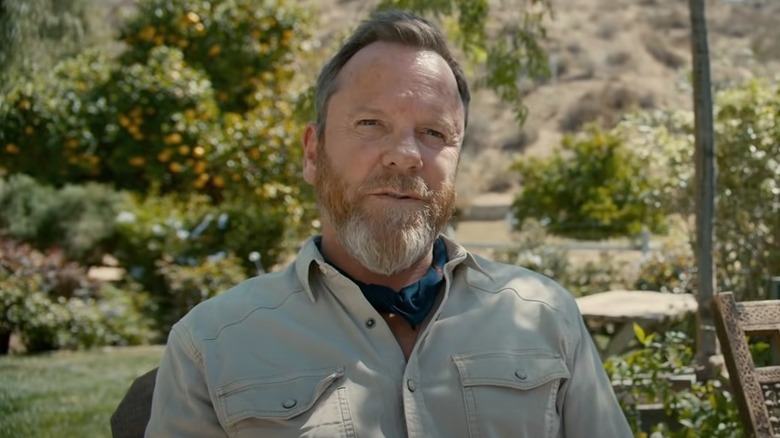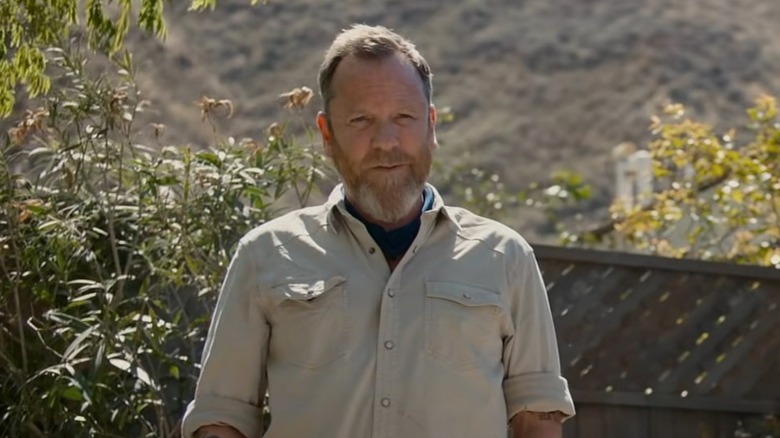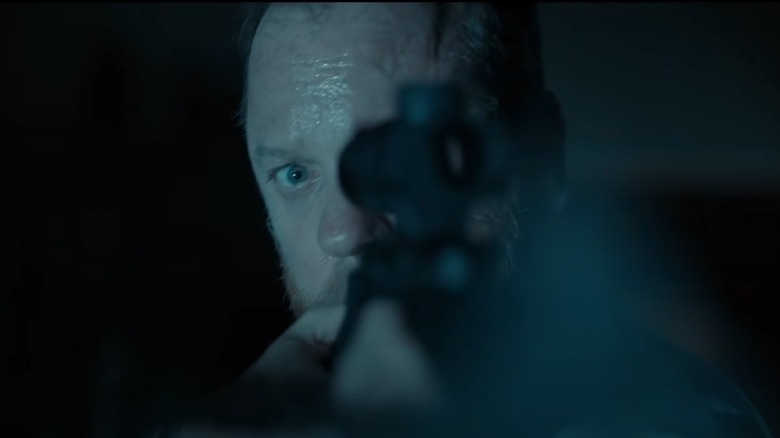The Contractor Actor Kiefer Sutherland On Shooting A Thriller With A Realistic Edge [Interview]
Tarik Saleh's "The Contractor" drops in theaters today, telling the story of former Special Forces soldier James Harper (Chris Pine), who gets more than he bargained for when he enters the messy world of private military contractors. He unknowingly makes a rhetorical devil's bargain with Rusty Jennings (Kiefer Sutherland), the very persuasive leader of a military contractor crew. The film is an engaging thriller that takes a pointed look at some serious issues in the worlds of both the Special Forces and contractors.
"The Contractor" is a film that isn't afraid to showcase the darker parts of military life and the toll of modern warfare on even the most committed of soldiers. I spoke with Kiefer Sutherland about the factors that drew him into the project, the film's approach to these timely issues, working with director Tarik Saleh and executive producer/star Chris Pine, and more.
This interview has been lightly edited for clarity and brevity.
'I wasn't aware that the circumstances could be as egregious as they are'
Rusty is such an interesting, charismatic, yet treacherous character. What brought you on to "The Contractor"?
My decision for doing one job over another will always be [based] on the script and will be the whole story. If I get moved by the idea of a story, I really don't care what character I played. So if you're the singer, great. If you're the bass player, great. As long as you're part of telling that story. This was no different. I really love the script. I'm a huge fan of the thriller genre, and this was just really an elevated thriller, for me. It was dealing with something that I wasn't very familiar about, on two levels.
I wasn't as familiar with the fact that the Special Forces kind of discarded and unceremoniously released their soldiers, were kind of kicking them to the curb [in a way] that leaves those soldiers incredibly vulnerable. I wasn't aware that the circumstances could be as egregious as they are ... but I was really not aware that there were recruiters out there that were really trying to find the brightest and the best of the Special Forces' retirees, and using them for private operations for private corporations. That's a scary scenario and I thought that was fascinating, so I really wanted to be a part of telling that story. And then, Chris Pine and Ben Foster made a movie called "Hell or High Water" together, and I just thought that there was such an incredible, dynamic connection between the two of them as actors that they ended up making one of my favorite films of the decade, so I was really eager to work with both of them. I got to work with Chris primarily on this, and just loved every second of it.
'One of the things directed was just to keep everything lean and very realistic'
You brought up something that I found really interesting about the film. It has such a modern, critical take on the state of contracting that's very nuanced. Can you talk a little about the director's approach to these issues in the film?
Well, one of the things directed was just to keep everything lean and very realistic. So "24," for instance, a thriller that I was a part of for nine years, we took a very different approach. We wanted big and glossy. So it's kind of the difference between "48 Hours" and "Beverly Hills Cop," right? Where "24" was certainly meant as a fantastical idea, this is meant as a very real observation on something. And so it's going to have the tone of "The French Connection," it's going to have a realistic tone that I think really separated it and allowed you to kind of absorb the information in a very realistic way. It's a very Scandinavian, kind of Northern European filmmaking style, you know. My experience with Lars von Trier's "Melancholia," I can certainly see shades of that, where I just saw this kind of minimalist attitude, let the script and the people do the work. I appreciate that a lot.
It really does contribute towards the realistic feeling of it, which is welcome.
[Spoilers for "The Contractor" ahead.]
Tell me about your final scene with Chris. What went into that scene and what was that process like?
What was really interesting is it's one of the things that I've done a lot of, right? I've shot a lot of people, and I've been shot a lot over the course of my career. One moment that I thought was really cool was [where] I've been shot in the arm. I thought, "How sad is it going to be that this former Special Forces soldier is so wounded now [that] he can't even pick up his gun, but that he tries, and the gun goes off and shoots the floor and actually knocks him down?" It's such a feeble move, right? They were like, "Oh, that's cool, try it!"
[... I appreciated] their openness to trying something like that, and it ended up looking really sad and pathetic. So again, you know, I have found in my career that when you're working with people who are incredibly confident about what they do, they're open to trying stuff and they're open to letting you try something. Certainly I'm far down the ladder rung on this movie, so to be allowed to be having these opportunities I was grateful for, that speaks to Tarik as a director, and Chris's interest in how to try and make a scene better. And I only got to shoot Ben from a distance, but Chris and I got up close and personal and I just thought he was fantastic.
"The Contractor" is in theaters now.


